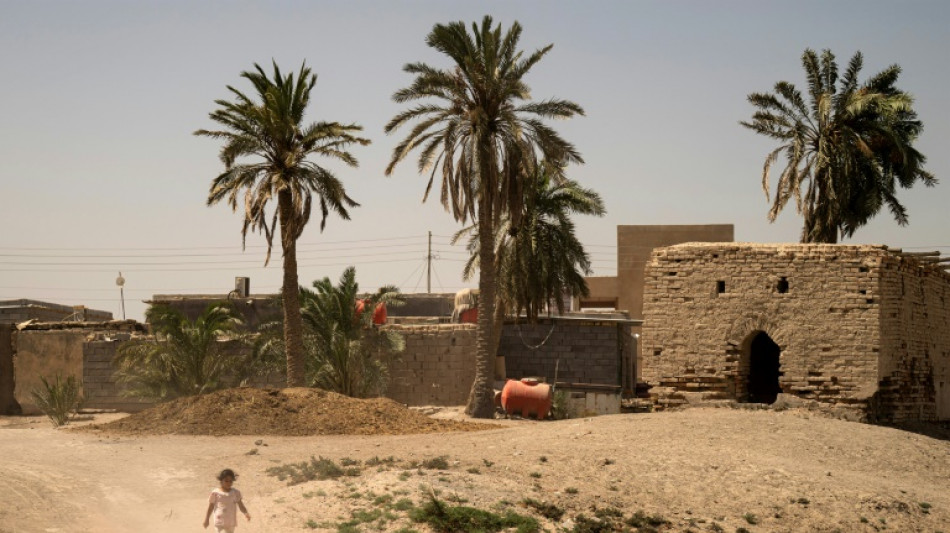
-
 'Animals in a zoo': Swiatek backs Gauff call for more privacy
'Animals in a zoo': Swiatek backs Gauff call for more privacy
-
Japan PM's tax giveaway roils markets and worries voters

-
 Amid Ukraine war fallout, fearful Chechen women seek escape route
Amid Ukraine war fallout, fearful Chechen women seek escape route
-
Rybakina surges into Melbourne semis as Djokovic takes centre stage

-
 Dollar struggles to recover from losses after Trump comments
Dollar struggles to recover from losses after Trump comments
-
Greenland blues to Delhi red carpet: EU finds solace in India

-
 Will the EU ban social media for children in 2026?
Will the EU ban social media for children in 2026?
-
Netherlands faces 'test case' climate verdict over Caribbean island

-
 Rybakina stuns Swiatek to reach Australian Open semi-finals
Rybakina stuns Swiatek to reach Australian Open semi-finals
-
US ouster of Maduro nightmare scenario for Kim: N. Korean ex-diplomat

-
 Svitolina credits mental health break for reaching Melbourne semis
Svitolina credits mental health break for reaching Melbourne semis
-
Japan's Olympic ice icons inspire new skating generation

-
 Safe nowhere: massacre at Mexico football field sows despair
Safe nowhere: massacre at Mexico football field sows despair
-
North Korea to soon unveil 'next-stage' nuclear plans, Kim says

-
 French ex-senator found guilty of drugging lawmaker
French ex-senator found guilty of drugging lawmaker
-
US Fed set to pause rate cuts as it defies Trump pressure

-
 Sleeping with one eye open: Venezuelans reel from US strikes
Sleeping with one eye open: Venezuelans reel from US strikes
-
Venezuela's acting president says US unfreezing sanctioned funds

-
 KPop Demon Hunters star to open Women's Asian Cup
KPop Demon Hunters star to open Women's Asian Cup
-
Trump warns of 'bad things' if Republicans lose midterms

-
 Russian strikes in Ukraine kill 12, target passenger train
Russian strikes in Ukraine kill 12, target passenger train
-
With Maduro gone, Venezuelan opposition figure gets back to work

-
 Celebrities call for action against US immigration raids
Celebrities call for action against US immigration raids
-
Rubio to warn Venezuela leader of Maduro's fate if defiant

-
 Denver QB Nix 'predisposed' to ankle injury says coach
Denver QB Nix 'predisposed' to ankle injury says coach
-
Lula, Macron push for stronger UN to face Trump 'Board of Peace'

-
 Prass stunner helps Hoffenheim go third, Leipzig held at Pauli
Prass stunner helps Hoffenheim go third, Leipzig held at Pauli
-
Swiss Meillard wins final giant slalom before Olympics

-
 CERN chief upbeat on funding for new particle collider
CERN chief upbeat on funding for new particle collider
-
Trump warns US to end support for Iraq if Maliki returns

-
 Judge reopens sexual assault case against goth rocker Marilyn Manson
Judge reopens sexual assault case against goth rocker Marilyn Manson
-
South Korea's ex-first lady to learn verdict in corruption case

-
 Rosenior dismisses Chelsea exit for 'untouchable' Palmer
Rosenior dismisses Chelsea exit for 'untouchable' Palmer
-
Markram powers South Africa to win over West Indies

-
 Vladimir Padrino: Venezuela's military power broker
Vladimir Padrino: Venezuela's military power broker
-
Amazon closing Fresh and Go stores in Whole Foods push

-
 Koepka nervous about game and fans in PGA Tour return
Koepka nervous about game and fans in PGA Tour return
-
Trump's Iowa trip on economy overshadowed by immigration row

-
 Dortmund coach says Inter Milan are improved under Chivu
Dortmund coach says Inter Milan are improved under Chivu
-
US border chief in Minneapolis as Trump tries to calm crisis

-
 What to know about America's colossal winter storm
What to know about America's colossal winter storm
-
Iran warns against 'instability' after US strike group arrives

-
 GM reports quarterly loss but boosts shareholder returns
GM reports quarterly loss but boosts shareholder returns
-
US banks fight crypto's push into Main Street

-
 NFL Bills make offensive coordinator Brady new head coach
NFL Bills make offensive coordinator Brady new head coach
-
TikTok settles hours before landmark social media addiction trial

-
 Newcastle braced for 'ultimate test' against PSG after storm disruption
Newcastle braced for 'ultimate test' against PSG after storm disruption
-
Brook blitz ends Sri Lanka's unbeaten home run, England clinch series

-
 LVMH 2025 net profit drops 13% to 10.9 bn euros
LVMH 2025 net profit drops 13% to 10.9 bn euros
-
Philip Glass pulls Kennedy Center premiere after Trump takeover


Water salinity hurting farmers, livestock in Iraq
Iraqi farmer Umm Ali has watched her poultry die as salinity levels in the country's south hit record highs, rendering already scarce water unfit for human consumption and killing livestock.
"We used to drink, wash and cook with water from the river, but now it's hurting us," said Umm Ali, 40, who lives in the once watery Al-Mashab marshes of southern Iraq's Basra province.
This season alone, she said brackish water has killed dozens of her ducks and 15 chickens.
"I cried and grieved, I felt as if all my hard work had been wasted," said the widowed mother of three.
Iraq, a country heavily impacted by climate change, has been ravaged for years by drought and low rainfall.
Declining freshwater flows have raised salt and pollution levels, particularly further south where the Tigris and Euphrates rivers converge before spilling into the Gulf.
"We haven't seen such high levels of salinity in 89 years," Iraq's water ministry spokesman Khaled Shamal said.
Last month, salinity levels recorded in central Basra province soared to around 29,000 parts per million compared to 2,600 ppm last year, according to a report from the ministry.
Freshwater should contain less than 1,000 ppm of dissolved salts, while ocean water salinity levels are around 35,000 ppm, according to the US Geological Survey.
- Dead buffalo -
The Tigris and Euphrates converge at Basra's Shatt al-Arab waterway "laden with pollutants accumulated along their course", said Hasan al-Khateeb, an expert from Iraq's University of Kufa.
In recent weeks, the Euphrates has seen its lowest water levels in decades, and Iraq's artificial lake reserves are at their lowest in recent history.
Khateeb warned that the Shatt al-Arab's water levels had plummeted and it was failing to hold back the seawater from the Gulf.
Farmer Zulaykha Hashem, 60, said the water in the area had become very brackish this year, adding that she has to wait for the situation to improve in order to irrigate her crop of pomegranate trees, figs and berries.
According to the United Nations, almost a quarter of women in Basra and nearby provinces work in agriculture.
"We cannot even leave. Where would we go?" Hashem said, in a country where farmers facing drought and rising salinity often find themselves trapped in a cycle of water crisis.
The UN's International Organization for Migration, which documents climate-induced displacement in Iraq, has warned that increased water salinity is destroying palm groves, citrus trees and other crops.
As of October last year, some 170,000 people were displaced in central and southern Iraq due to climate-related factors, according to the agency.
Water scarcity pushed Maryam Salman, who is in her 30s, to leave nearby Missan province for Basra several years ago, hoping her buffalo could enjoy the Shatt al-Arab.
Near her house, AFP saw three buffalo skeletons on the parched land, with locals saying the animals had died due to lack of water.
Rising salinity is not the only problem now, said Salman, a mother of three children.=
"Water is not available... neither summer nor winter," she said.
- Fewer fish -
The Tigris and Euphrates originate in Turkey, and Iraqi authorities have repeatedly blamed dams across the border for significantly reducing their flows.
Iraq receives less than 35 percent of its allocated share of water from the two rivers, according to authorities, in a country with inefficient water management systems after decades of war and neglect.
Khateeb from the University of Kufa said that in addition to claiming its share of the rivers, Iraq must pursue desalination projects in the Shatt al-Arab.
In July, the government announced a desalination project in Basra with a capacity of one million cubic meters per day.
Local residents said the brackish water was also impacting fish stocks.
Hamdiyah Mehdi said her husband, who is a fisherman, returns home empty-handed more frequently.
She blamed the Shatt al-Arab's "murky and salty water" for his short temper after long days without a catch, and for her children's persistent rash.
"It has been tough," said Mehdi, 52, noting the emotional toll on the family as well as on their health and livelihood.
"We take our frustrations out on each other."
A.Zbinden--VB


